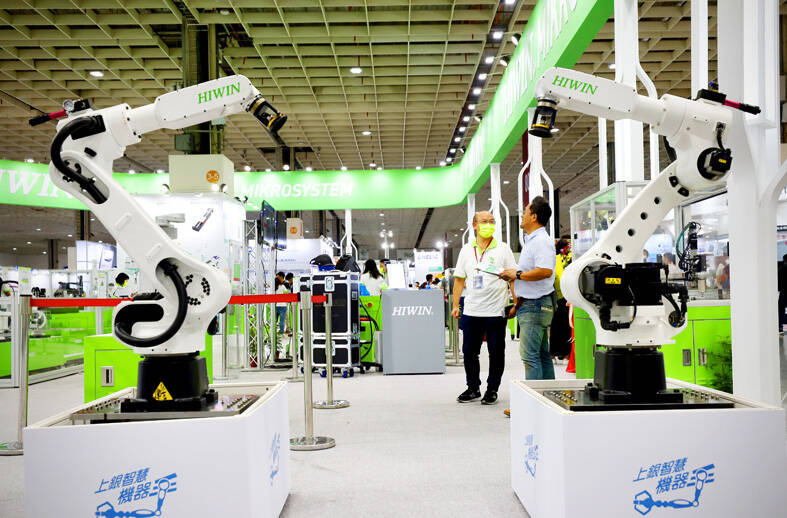Three incentive packages offered by the Ministry of Economic Affairs (MOEA), which were launched in 2019, have convinced local companies to invest more than NT$2.1 trillion (US$68.33 billion) in Taiwan, ministry statistics released on Saturday showed.
The three incentive packages, which offer preferential loans to encourage investments in Taiwan, have prompted more than 1,400 local companies to agree to pour funds into Taiwan since 2019, and are expected to create 149,000 jobs, the ministry said in a statement.
With Taiwan Semiconductor Manufacturing Co (台積電), the world’s largest contract chipmaker, keen to expand production and upgrade technologies in Taiwan, 22 of its suppliers such as IC packaging and testing service provider ASE Technology Holding Co (日月光半導體) and silicon wafer maker Wafer Works Corp (合晶科技), have promised to invest NT$66 billion in Taiwan under the three incentive packages, the ministry said.

Photo: Ritchie B. Tongo, EPA-EFE
Amid escalating trade tensions between the US and China, the ministry launched the first package of incentives on Jan. 1, 2019, which involved the Cabinet’s National Development Fund assigning NT$210 billion in preferential loans to persuade Taiwanese investors with operations in China to return to Taiwan.
The incentives are aimed at reducing Taiwan’s reliance on the Chinese market and at mitigating negative effects caused by trade tensions between Washington and Beijing.
Another incentive package was launched on July 1, 2019, by the National Development Fund to assign NT$100 billion in preferential loans to help local small and medium-sized enterprises invest in Taiwan.
The third package consists of a fund that has assigned NT$120 billion since July 1, 2019, to encourage enterprises not covered by the first and second packages to invest in innovative industries.
The three incentive packages, which have been extended for an additional three years, focus on the government’s “5 plus 2 industries” development projects, which are smart machinery, making Taiwan Asia’s Silicon Valley, green technologies, biotech, national defense, new agriculture and the circular economy.
The ministry said the more than NT$1.2 trillion in investment pledged by these enterprises has been leading to an upgrade in local industries, which helped the local economy fend off not only the impact from trade tensions between the US and China, but also the effects from interruptions in the global supply chain caused by the COVID-19 pandemic.
A large number of investment projects under the three packages involve artificial intelligence development and electric vehicle-related industries, which are expected to help Taiwan seize business opportunities in these emerging sectors on the global market, the ministry said.
The ministry said Taiwan has commanded the lead over many other countries in the information technology industry, so many Taiwanese companies have become part of the global supply chain of US electric vehicle brand Tesla Inc.
Twenty-nine Taiwanese key component firms have served as Tesla suppliers in a wide range of products, such as power systems, electric motors, batteries, vehicle frames and charging systems, a report by the Chinese-language CommonWealth Magazine said.
Among the companies echoing the government’s call to invest in Taiwan’s EV market were flat-panel supplier Innolux Corp (群創), contract electronics maker Pegatron Corp (和碩), thick film substrate producer Tong Hsing Electronic Industries Ltd (同欣電子) and forged wheel supplier SuperAlloy Industrial Co (巧新), which have been part of Tesla’s supply chain, the ministry said.
Some old-economy companies have also entered the EV market as they have set sights on new energy development by applying for the ministry’s incentive programs.
One of them is petrochemical conglomerate Formosa Plastics Group (台塑集團), which is investing in lithium-titanate battery development, and Kwang Yang Motor Co (光陽工業), a major manufacturer of motorbikes under the Kymco brand, which has started to roll out electric scooters.
The three packages are scheduled to expire at the end of this year.

BUSINESS UPDATE: The iPhone assembler said operations outlook is expected to show quarter-on-quarter and year-on-year growth for the second quarter Hon Hai Precision Industry Co (鴻海精密) yesterday reported strong growth in sales last month, potentially raising expectations for iPhone sales while artificial intelligence (AI)-related business booms. The company, which assembles the majority of Apple Inc’s smartphones, reported a 19.03 percent rise in monthly sales to NT$510.9 billion (US$15.78 billion), from NT$429.22 billion in the same period last year. On a monthly basis, sales rose 14.16 percent, it said. The company in a statement said that last month’s revenue was a record-breaking April performance. Hon Hai, known also as Foxconn Technology Group (富士康科技集團), assembles most iPhones, but the company is diversifying its business to

Apple Inc has been developing a homegrown chip to run artificial intelligence (AI) tools in data centers, although it is unclear if the semiconductor would ever be deployed, the Wall Street Journal reported on Monday. The effort would build on Apple’s previous efforts to make in-house chips, which run in its iPhones, Macs and other devices, according to the Journal, which cited unidentified people familiar with the matter. The server project is code-named ACDC (Apple Chips in Data Center) within the company, aiming to utilize Apple’s expertise in chip design for the company’s server infrastructure, the newspaper said. While this initiative has been

GlobalWafers Co (環球晶圓), the world’s No. 3 silicon wafer supplier, yesterday said that revenue would rise moderately in the second half of this year, driven primarily by robust demand for advanced wafers used in high-bandwidth memory (HBM) chips, a key component of artificial intelligence (AI) technology. “The first quarter is the lowest point of this cycle. The second half will be better than the first for the whole semiconductor industry and for GlobalWafers,” chairwoman Doris Hsu (徐秀蘭) said during an online investors’ conference. “HBM would definitely be the key growth driver in the second half,” Hsu said. “That is our big hope

The consumer price index (CPI) last month eased to 1.95 percent, below the central bank’s 2 percent target, as food and entertainment cost increases decelerated, helped by stable egg prices, the Directorate-General of Budget, Accounting and Statistics (DGBAS) said yesterday. The slowdown bucked predictions by policymakers and academics that inflationary pressures would build up following double-digit electricity rate hikes on April 1. “The latest CPI data came after the cost of eating out and rent grew moderately amid mixed international raw material prices,” DGBAS official Tsao Chih-hung (曹志弘) told a news conference in Taipei. The central bank in March raised interest rates by